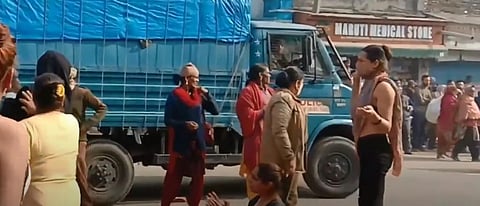Why Jammu’s transgender community hit the streets in protest
Several groups of the community came together at Bikram Chowk on January 21, 2021 to take out a nude protest. Four transgender persons were allegedly abudcted and forcefuly castrated by rival groups the day before. The community was protesting the police inaction against the case.
Unclothed protestors blocked the Jammu-Pathankot highway and were later lathicharged by the police and thrown in to a van.
Rubina, a leader of a transgender group, told Down to Earth that police did not take any action on their complaints. “There is nobody to stand for our rights. The harassment is consistent but for the first time, we protested. Our protest was diluted and there is little hope for justice,” she said.
This triggered a wave of protests in the city. The already-marginalised community has been one of the worst sufferers of the communication blackout in Jammu and Kashmir since the abrogation of Article 370 in August, 2019.
The novel coronavirus disease (COVID-19) pandemic followed the communication blackouts. The lockdown restrictions pushed the transgenders, who mostly earn a living performing in weddings and other ceremonies, into further misery.
Moreover, unlike in Kashmir, the community is divided into clusters in Jammu, without activists or leaders bringing them together.
Rani, a transgender from Chhattisgarh, who now lives in Jammu, told Down to Earth that because of the lockdown norms, they were not invited for any Badhai (a wedding ritual) ceremony, which is usually a source of income for them.
“We had no food. We shared shelter to survive and now, this harassment has increased our pain. I participated in the protest because I want justice for my fellow sisters. But we were unheard, and we remain unheard,” she said.
Rani added that the community has boycotted the local media as well.
The state had declared a monthly financial assistance for the community in May, 2020 under the chairmanship of the then Lieutenant Governor Girish Chandra Murmu.
The monthly aid of Rs 1,000 is not enough, Aijaz Ahmad, an LGBTQI+ activist from Jammu and Kashmir told Down to Earth.
Transgender persons are disowned by their families and need a bigger financial stimulus and psychological support, he added.
Ahmad said:
“There is no such place to go where the third gender people are not harassed. To start with, we need education for transgenders people. I have been fighting for LGBTQI+ rights since 2011, and I received no support till 2018. Only education can bring about the necessary changes in our lives.”
The activist, who is the author of Hijras of Kashmir, added that the protest in Jammu by is a sign of awareness. The religious and societal norms, along with the political situation of J&K, have stunted the development of the community.
There are people in the state who are fighting for LGBTQI+ rights but refrain from coming out in the open, he said.
The protestors had gathered on the busy Shalimar Road on February 18 as well to voice their demands and announced that they will continue the gatherings from Monday.
Ahmad and Rubina claimed that they have received numerous death threats from religious and political parties for their activism.


